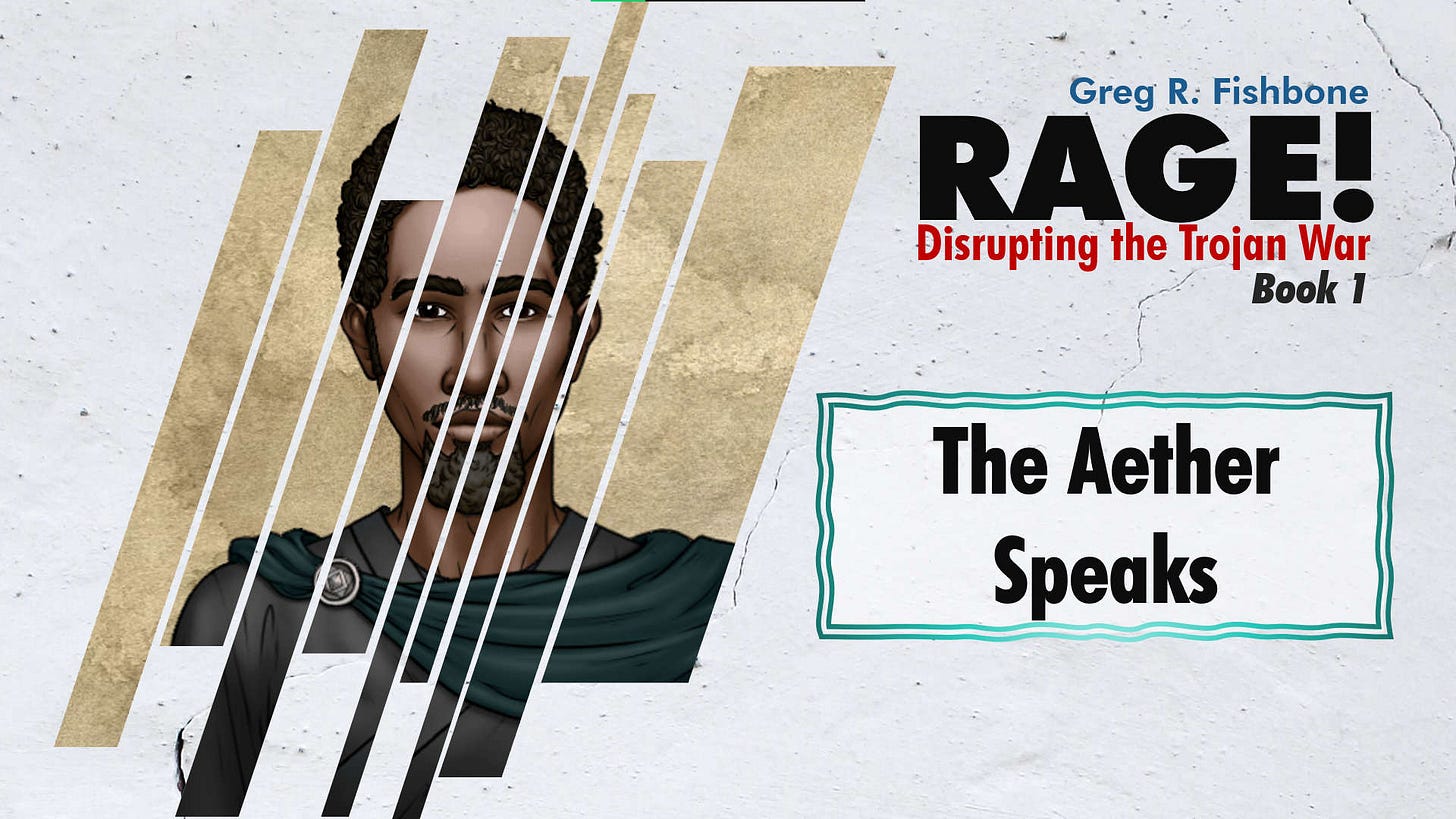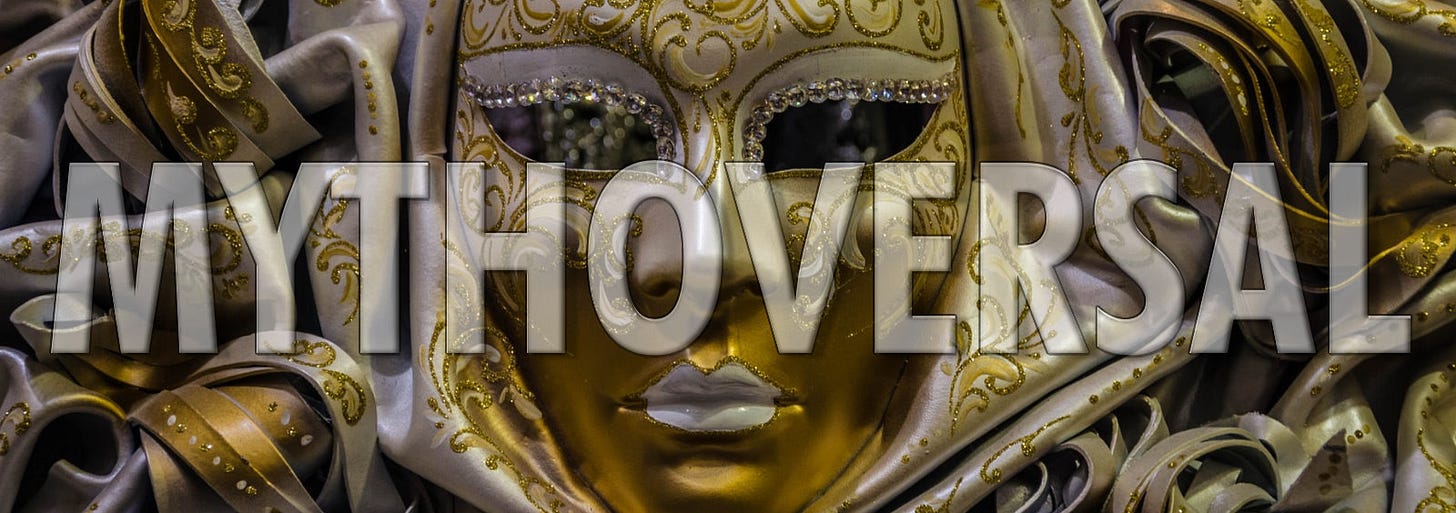Trojan War Wednesday: Neurodiversity in Greek Mythology
Disrupting the Trojan War: Part 3 - "When the Trojans confused neurodivergence with madness, they missed their best chance to save their civilization from collapse."
You Are Here…
…at the third in a planned series of five essays on disrupting ancient texts. These essays present my own understanding as I continue to evolve the approach I’m using to write stories set in the world of Greek mythology. And while each essay represents nothing more than my own personal opinions and a chance to offer readers a glimpse into my writing process, I hope other authors may find them useful in their own efforts as well.
The first essay explored issues of gender and agency.
The second essay dealt with ethnic and racial diversity.
This is part three, on the subject of neurodiversity.
On the Subject of Neurodiversity…
Writing this newsletter often reminds me of a blog I once had. Mainly it reminds me that I was never cut out to be a blogger. The main reason was that, immediately after hitting the publish button, I’d get hit with a dozen ideas for revising, rewording, and enhancing the post I’d just sent out into the world. The thought that anyone might read something less than my best possible work was panic-inducing.
As a result, my blog posts were time-consuming, sporadically released, and subject to endless rounds of later revision. This was not how a blog was supposed to work, and made for an ever-shifting website that was impossible to follow and miserable to write.
I used to envy people whose brains worked differently than mine, allowing them to forget their last blog post while focusing on the next. They seemed to have figured out a way to effortlessly write in the moment, and then to let that moment go. They seemed to have a switch in their heads that I didn’t have. Their posts extended a string of pearls, while mine added to a pile of unfinished garbage.
In the society we live in, in most settings, I am considered neurotypical. But in the world of blogging, my brain is maladaptive.
I’ve come to understand since then that all brains have their strengths and their challenges. I’ve come to understand that neurodiversity exists within the neurotypical range as much as it does on the autism spectrum or among those with ADHD. And I’ve come to understand that neurodiversity is not a flaw, but a common feature of the human experience. In a team setting, in a brainstorming session, in any creative endeavor, neurodiversity within a group of people leads to a wider range of approaches and greater chances of success.
Even a brain that’s well-adapted to one set of localized norms might be considered neurodivergent in a different era, in a different setting, under different circumstances, or while engaged in different tasks. I like to believe that my revision-oriented brain is useful for writing quality fiction. I wouldn’t want to change that, even if it does give me greater difficulty in letting go of the ephemeral writing in blog posts, journal entries, and emails.
And newsletters.
What I’ve had to do in order to get this newsletter out is to create strategies for myself. These include posting to a strict schedule, giving myself extra writing time, and allowing myself the freedom to put corrections and addenda into a later issue.
And Speaking of Corrections and Addenda…
Addendum #1: In the first essay in this series, on gender and agency in Greek mythology, I should have brought up something I noticed when reading the ancient Posthomeric version of Amazons at Troy, which was written during the Roman era about events of the Late Bronze Age:
There was not a single instance in that story of a male character feeling threatened or emasculated by the presence of women on the battlefield. There was not a single character who seemed to believe that the Amazons should be engaged in the more typically feminine behaviors of Trojan or Achaean culture. There was not a single character who seemed to treat the Amazon warriors any differently than they would a male ally or enemy in the war. An implication was made that any ordinary woman of Troy could pick up a weapon and fight as effectively as a man, if only they’d been trained to do so.
This treatment felt progressive, but alien to how writers in today’s popular culture might depict the reception of an all-woman band of warriors in the ancient world. I’m still working through the reasons and implications, but for now, I’ll just note as interesting the fact that “warrior” wasn’t seen as a necessarily gendered role in ancient texts, nor were women necessarily seen as less capable of it than men.
Addendum #2: In the second essay of this series, on ethnic and racial diversity, I realize now that I failed to consider the modern intersectionality of race and class.
The world of Greek mythology predates our modern conceptions of race, but included a rigid hierarchy of class and a caste of enslaved people. There were few paths for upward mobility in the Bronze Age, while a downward tumble into slavery was always just a war, raid, or invasion away.
There was no linkage between class and ethnicity. Ancient individuals of any ethnicity could own slaves, or could become slaves. But our own culture’s historic experience with race-based chattel slavery and ongoing class-based racial disparities can transfer modern baggage onto attempts at accurate historical depictions of ancient slavery practices.
I don’t have an answer to this problem yet, from a writing perspective. As the essays in this series are works in progress, I hope to develop some further thoughts in the future and return for a deeper dive into each of these topics.
Your suggestions in the comments are welcome, as always. Now on to…
Writing Neurodiversity in Greek Mythology
The range of what’s considered “typical” brain functioning varies over time and from culture to culture, but all cultures have included people whose brains have diverged from their society’s norms.
In Ancient Greece, stories emerged from a belief that neurodivergence signified a special connection to the gods. In the case of seers, their neurodivergence manifested as an ability to predict future events, a literal superpower.
Greek mythology features many powerful seers who perceived the world in atypical ways. The seers most active in the Trojan War include Calchas on the Achaean side, and Helenus and Cassandra on the Trojan side. Ancient peoples told stories about these characters, in part, to work through explanations for the neurodivergence they witnessed in their own societies.
Cassandra’s powers of prediction come with a curse that makes everyone disbelieve her always-accurate warnings. In-story characters treat Cassandra as if she were suffering from a mental illness, while the audience is meant to know that Cassandra is just misunderstood.
What better parable could there have been for those same audience members to attempt a better understanding of the neurodivergent people in their own lives? What better lesson could there be for us than to consider: when the Trojans confused neurodivergence with madness, they missed their best chance to save their civilization from collapse.
Unfortunately, stories that include seers, when told from the perspective of neurotypical protagonists, tend to focus more on the prophecies than on the prophets. And the backstory explanation that the gods “did something” to turn people who were born neurotypical into neurodivergent seers becomes problematic in modern contexts. Today, we understand that divergent brains aren’t broken or altered. They just work differently, and always have.
That presents a challenge in retelling these myths for the modern world. One solution may be to downplay or omit the “how a seer became a seer” backstory. Another might be to depict typical, divergent, and supernatural brain functioning as just one aspect of many that determine who each character is, along with personality, wants and desires, fears, relationships, goals, accomplishments, etc.
Layered on top of neurodiversity are variances in personality. For this, I recommend David W. Frauenfelder’s guidebook, Zeus is My Type, which takes sixteen gods and goddesses from Greek mythology and analyzes their personalities from the point of view of the Jungian personality system, most popularly interpreted through the Myers-Briggs Type Indicator (MBTI). David also publishes an excellent newsletter that you should check out.
Neruodiversity and personality diversity are very different things. According to David’s analysis, I share a Myers-Briggs personality type with Athena. The Goddess of Wisdom and I are both INTJs. And there are fifteen other personality types that gods and mortals can fall into. But the theoretical brain functioning that Olympian gods and goddesses share with each other, the way they would think and perceive the world, would be entirely different from that of any mortal.
To the gods, we are all neurodivergent.
Let me know what you think in the comments, and if you read David’s book, feel free to share the god or goddess you match up with. Also feel free to forward this newsletter to anyone who may find it useful.
Next week, in Part Four, we’ll consider LGBTQ characters in Greek mythology.
—Greg R. Fishbone, Mythoversal Author-in-Residence
Nine years into the siege of Troy, the greatest Achaean warrior, Achilles, is sidelined by rage and resentment following a conflict with his commander, Agamemnon. This short but intense phase of warfare leads to devastating losses on both sides, conflict among the gods, and great tragedy on a human level.
Rage! is a disruptive retelling of Homer’s Iliad, restoring diversity, inclusion, and equity to a three-thousand-year-old tradition.
This week’s Rage centers Eurybates, Agamemnon’s herald, as he and his partner confront Achilles (with the fortifying aid of alcohol) on a mission to seize something of great value without getting themselves killed.
Through retold myths, informational articles, and educational resources, Mythoversal seeks to foster a deeper understanding of traditional cultures, their impact on each other, and on the modern world.
Our entry point into the Mythoverse is the land of Mythoversal Hellas, where we disrupt and deconstruct Greek, Hellenic, Roman, and Byzantine sources to create a mythic environment that's inclusive, inviting, relevant, and welcoming. The result is both a setting and a lens for modern readers.
The Mythoversal Newsletter brings author commentary, mythological movie reviews, and occasional essays to your inbox. If a friend forwarded this issue to you, consider subscribing for yourself to be sure you don't miss any future content.










Thank you for the mention!
These are only problems if you decide to make them such. This is especially the case with your examples of slavery, which is a positive chance to be educational about history, and the case of Cassandra, which isn't about being neuroatypical, but rather is a curse. You can make her that if you want, and you can change the story to make them not believe her for some other reason, but that's only a problem if you make it one.
I enjoy seeing an interesting neuroatypical character as much as anyone else on the spectrum, but doing so with Cassandra - to me - seems like a mistake, as the core trait of her situation was the contrast between Apollo's curse and her powers, not that she herself was unusual.
Personally, if I were to write the Iliad in a more modern way, with the angle of any of the main chracters being NA, I'd go with Achilleus and Oddyseus. You don't have to change their characters, or their defining situations in the story, to do that.